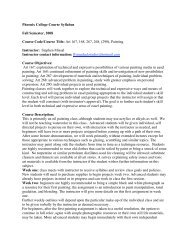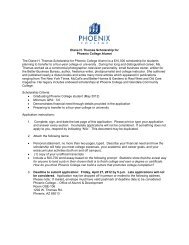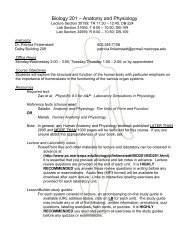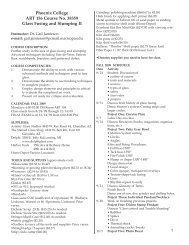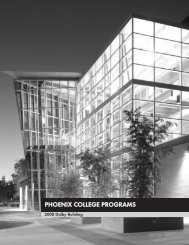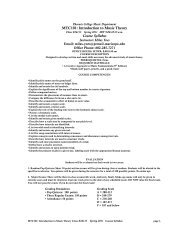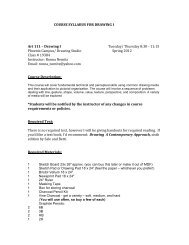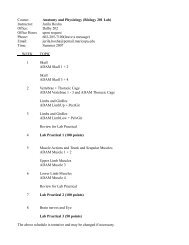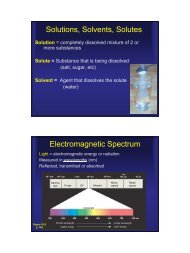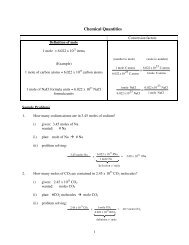Phoenix College Catalog 2009-10
Phoenix College Catalog 2009-10
Phoenix College Catalog 2009-10
Create successful ePaper yourself
Turn your PDF publications into a flip-book with our unique Google optimized e-Paper software.
<strong>Phoenix</strong> <strong>College</strong> <strong>2009</strong>–20<strong>10</strong> CATALOG | 45<br />
B.<br />
The Maricopa Community <strong>College</strong> District shall:<br />
1. Visibly demonstrate a performance of the Maricopa<br />
Community <strong>College</strong> District "duty to care."<br />
2. Comply with requirements for federal funds.<br />
3. Describe what the college does about substance abuse/<br />
misuse (alcohol, drugs, anabolic steroids).<br />
4. Inform/educate members of the academic community of<br />
adverse effects of these substances.<br />
5. Inform/educate the academic community about the policies<br />
concerning substance misuse and abuse.<br />
6. Discourage illegal drug abuse and legal substance misuse.<br />
7. Provide individual and group counseling.<br />
8. Provide assistance and guidance to obtain treatment and<br />
rehabilitation of any identified problem.<br />
To achieve these objectives, the program must provide an<br />
environment capable of:<br />
1. Developing and implementing substance misuse/abuse<br />
prevention programs.<br />
2. Providing educational training and prevention programs for<br />
the college and community it serves.<br />
3. Providing timely and accurate information dissemination.<br />
4. Establishing supportive counseling programs as needed.<br />
5. Establishing a strong on-going evaluation of services.<br />
6. Providing assistance to obtain treatment and rehabilitation<br />
of substance abuse/misuse.<br />
7. Clarifying the college regulations for control of alcohol and<br />
drug use.<br />
8. Providing procedures that the college will follow to correct<br />
and stabilize emergency situations.<br />
Each college will identify key people to provide emergency<br />
services and to contact and work with outside agencies.<br />
The Maricopa Community <strong>College</strong> District is committed to<br />
establishing a preventative substance abuse program at each<br />
college designed to affect positively the problems of irresponsible<br />
use of alcohol and the use and abuse of illegal substances. A<br />
main focus of the program will be on education of the campus<br />
community and assistance to individuals.<br />
The Maricopa Community <strong>College</strong> District fully supports<br />
disciplinary action for misconduct and the enforcement of state<br />
laws governing the use of alcohol and the use, abuse, possession<br />
or distribution of controlled substances or illegal drugs.<br />
Student Program to Prevent Illicit Use of Drugs and Abuse of<br />
Alcohol<br />
1. Introduction and Purpose<br />
The Federal Drug-Free Schools and Communities Act of<br />
1989 (Public Law <strong>10</strong>1-226) requires federal contractors and<br />
grantees to certify that they will provide a drug-free school.<br />
As a recipient of federal grants, the District must adopt a<br />
program toward accomplishing this goal. While federal<br />
legislation has been the impetus for creation of the<br />
program, the administration and Governing Board recognize<br />
that substance abuse is a problem of national proportions<br />
that also affect students at Maricopa Community <strong>College</strong>s.<br />
Based upon that concern, it is intended that this program<br />
on prevention of alcohol and drug abuse on college<br />
campuses will go beyond the strict dictates of the law and<br />
will serve as a comprehensive educational and resource<br />
tool.<br />
The Maricopa Community <strong>College</strong>s are committed to<br />
maintaining learning environments that enhance the full<br />
benefits of a student's educational experience. The<br />
Maricopa Community <strong>College</strong> District will make every<br />
effort to provide students with optimal conditions for<br />
learning that are free of the problems associated with the<br />
unauthorized use and abuse of alcohol and drugs. Part of<br />
the educational mission of Maricopa Community <strong>College</strong>s,<br />
in conjunction with this program, is to educate students<br />
2.<br />
3.<br />
4.<br />
about positive self-development, the benefits of a healthy<br />
lifestyle and the health risks associated with substance<br />
abuse.<br />
The purpose of this program is to:<br />
a. Ensure that the Maricopa Community <strong>College</strong>s<br />
working and learning environment for students and<br />
the public is safe, orderly and free of illegal activity.<br />
b. Comply with the Drug-Free School and Communities<br />
Act of 1989, and other relevant substance abuse<br />
laws.<br />
c. Provide students with access to appropriate treatment<br />
and rehabilitation assistance for problems associated<br />
with substance use or abuse.<br />
Standards of Conduct<br />
In the student handbooks of the Maricopa Community<br />
<strong>College</strong>s under codes of conduct, the following are<br />
examples of behavior that is prohibited by law and/or<br />
college rules and policies:<br />
a. Drinking or possession of alcoholic beverages on the<br />
college campus.<br />
b. Misuse of narcotics or drugs.<br />
Sanctions for Violation of Standards of Conduct<br />
Disciplinary actions include, but are not limited to:<br />
a. Warning,<br />
b. Loss of privileges,<br />
c. Suspension, or<br />
d. Expulsion.<br />
Legal Consequences of Alcohol and Other Drugs<br />
a. Laws Governing Alcohol<br />
The State of Arizona sets twenty-one as the "legal<br />
drinking age." An underage person who buys, receives,<br />
possesses or consumes alcoholic beverages is guilty<br />
of a misdemeanor and may be subject to a fine and<br />
imprisonment for up to six months.<br />
Revised Statutes, Title 28, Chapter 4, Article 3 prohibit<br />
driving while under the influence of intoxicating liquor<br />
or drugs (DWI). Drivers arrested for a DWI who refuse<br />
to be tested face suspension of their licenses or<br />
permits to drive for twelve months. A driver whose<br />
test results show a blood or breath alcohol<br />
concentration of 0.08 or more will, on conviction for a<br />
first offense, be sentenced to no less than ten days in<br />
jail, pay a fine of not less than $250, pay an additional<br />
assessment of $1,000, and may be required to<br />
perform community restitution and equip his or her<br />
vehicle with a certified ignition interlock device. On<br />
conviction of a second offense within 84 months, the<br />
person shall have his/her driving privilege revoked for<br />
one year. Additionally, this person shall be sentenced<br />
to not less than 90 days in jail, pay a fine of not less<br />
than $500, pay an assessment of $2,500, and shall be<br />
ordered to perform at least 30 hours of community<br />
restitution. Additionally, the person may be required to<br />
equip his or her vehicle with a certified ignition<br />
interlock device for up to twelve months starting on<br />
the date that his or her driving privileges are<br />
restored.<br />
b. Federal Penalties and Sanctions for Illegal Possession<br />
of a Controlled Substance<br />
First conviction: Up to one year imprisonment and<br />
fined at least $1,000 but not more than $<strong>10</strong>0,000, or<br />
both.<br />
After one prior drug conviction: At least fifteen days in<br />
prison, not to exceed two years and fined at least<br />
$2,500 but not more than $250,000, or both. (21<br />
United States Code §844)<br />
MCCCD Common Policies



